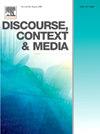The motives attributed to trollers in metapragmatic comments on alleged Chinese yinzhan (conflict-provoking trolling) posts
IF 3.1
2区 文学
Q1 COMMUNICATION
引用次数: 0
Abstract
This study adopts a metapragmatic perspective to investigate the linguistically-marked motives that participants attribute to those they perceive as trollers in online interactions. Focusing on the practice of yinzhan (引战, conflict-provoking trolling) on the Chinese Weibo platform, we analyse 296 metapragmatic comments on alleged yinzhan posts. Four primary motives behind yinzhan are identified: promotion, affiliation, profit-making, and emotional reasons. In contrast to prior studies that emphasise emotional or personality-related motives behind trolling behaviour, the findings indicate that yinzhan on Weibo is primarily framed as a commercial activity. Further analysis reveals significant variations in motive attribution patterns across different platform-verified identity categories (e.g., content creators vs. ordinary users), suggesting how Weibo’s commercalised architecture may shape interpretations of trolling. These results reflect the market-driven logic underlying trolling discourse within platform capitalism, offering new insights into the context-dependent nature of trolling. Additionally, the study would enrich the existing literature by introducing a metapragmatic framework to investigate folk theories of online behaviours as contested and constructed through users’ actual interactional practices.
在所谓的中国引战(挑起冲突的喷子)帖子上的元实用主义评论中,喷子的动机
本研究采用元语用学的视角来研究参与者在网络互动中认为是网络欺凌者的语言标记动机。针对中国微博平台上的“引战”行为,我们分析了296条关于“引战”的元语用评论。银展背后有四个主要动机:晋升、隶属关系、盈利和情感原因。与之前强调情感或个性动机的研究相反,研究结果表明,微博上的“刷屏”主要被视为一种商业活动。进一步的分析揭示了不同平台验证的身份类别(例如,内容创作者与普通用户)在动机归因模式上的显著差异,这表明微博的商业化架构可能会如何影响对钓鱼行为的解释。这些结果反映了平台资本主义中网络喷子话语背后的市场驱动逻辑,为网络喷子的语境依赖性质提供了新的见解。此外,该研究将通过引入元语用框架来调查民间的在线行为理论,从而丰富现有的文献,这些理论是通过用户的实际互动实践来争议和构建的。
本文章由计算机程序翻译,如有差异,请以英文原文为准。
求助全文
约1分钟内获得全文
求助全文

 求助内容:
求助内容: 应助结果提醒方式:
应助结果提醒方式:


